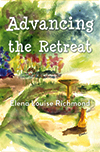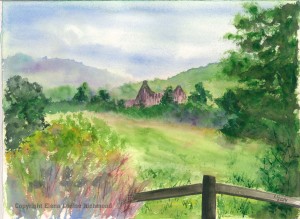The Wollstonecraft Women
I got a little exercised about Mary Wollstonecraft’s 1792 essay, A Vindication of the Rights of Woman, after I watched, in 2013, women being dragged out of the North Carolina and Texas legislatures and arrested for peaceful protest on their Capitol steps. I wasn’t sure I wanted to write about it because I found it utterly depressing. She was writing in the 18th century, but she could have been describing the home in which I grew up in the 1960s as well as attitudes still on display today. But in thinking about two remarkable women, Mary Wollstonecraft and her daughter Mary Shelley, I decided to give it a go and hope this doesn’t devolve into a feminist tirade. When men do it, it’s called rhetoric; but when women do it, it’s called being emotional/on the rag and is automatically discounted, even though Emotion and Menstruation are how any of us happen to be alive at all.
In A Vindication of the Rights of Woman Mary Wollstonecraft does a very canny thing: she draws a parallel between the socialization of women with that of the aristocracy and the military. In all three cases, values, behaviors, and perceptions are distorted to the point that members are not allowed to be fully human. “Women, in general, as well as the rich of both sexes, have acquired all the follies and vices of civilization, and missed the useful fruit.” I like to think this comparison roped in many more sympathetic readers and opened the minds of others, both men and women.
Here are some of her astonishingly contemporary observations:
She refers to books for and about women “written by men who considering females rather as woman than human. . .have been more anxious to make them alluring mistresses than affectionate wives and rational mothers. . .treated as a kind of subordinate beings, and not part of the human species,” and men have “found it convenient” to believe “the whole creation was only created for his convenience or pleasure.” This convenience creates a regal and “specious homage,” a false refinement that can be intoxicating, but is ultimately degrading. Today, unfortunately, these kinds of books are written mostly by women.
Mary W. addresses something that women today are still defensive about: the typical way women have found power: “Women are so degraded by mistaken notions of female excellence. . . produces a propensity to tyrannize, and gives birth to cunning, the natural opponent of (physical)strength.” She locates “feminine wiles” in a context informed by both sexes. If a relationship is not egalitarian, the alternative is sadism and passive aggression as a means of survival, not as consensual play.
In an advice book of the day, a Dr. Gregory asserts that a fondness for dress is “natural” to women. Mary W’s response gave me a full smile for 10 minutes after I read it: “I am unable to comprehend what either he or Rousseau mean when they frequently use this indefinite term. If they told us that in a pre-existent state the soul was found of dress, and brought this inclination with it into a new body, I should listen to them with a half smile, as I often do when I hear a rant about innate elegance. . .It is not natural; but arises, like false ambition in men, from a love of power.”
She discusses how passion and romance give way to friendship and love but that wives, however, are not considered friend material: “She was created to be the toy of man, his rattle, and it must jingle in his ears whenever. . .he chooses to be amused.”
She asks, “Do passive, indolent women make the best wives?. . . However convenient it may be found in a companion—that companion will ever be considered an inferior, and only inspire a vapid tenderness which easily degenerates into contempt.”
Here’s something that many “feminists” today still do not understand, but that Mary W. articulated beautifully over 200 years ago. First she cites Rousseau: “Educate women like men, and the more they resemble our sex the less power they will have over us.” Rousseau means well, but his is still a male-centric point of view. Mary W. skewers his comment, “I do not wish them to have power over men; but over themselves.” I might add that men have as much to learn from women as the other way around. Take that, Rousseau.
After reading Mary W’s impassioned and clearly articulated essay, it’s interesting to see how her daughter, Mary Wollstonecraft Shelley turned out: “I am not a person of opinions. . .Some have a passion for reforming the world. That my parents and Shelley were of the former class makes me respect it. . .If I have never written to vindicate the rights of women, I have ever defended women when oppressed. . .” Rattling the cages of 19th century norms may have skipped a generation in the Wollstonecraft family, but Mary Shelley wrote with the genius, grace, and insight that would have catapulted a man into the canon immediately.
It’s telling that Mary Shelley wrote about doppelgängers and split personalities. She must have felt both split and doubled within herself. She wrote Frankenstein when she was just 20 years old, and created a myth which entered the Zeitgeist and has not exited yet. One of her short stories, “Transformation,” is included in the Norton. It was an astonishing read. Astonishing because I think she’s a writer equal to her contemporaries in the male canon; and she is only getting the respect due her 200 years after her death.
The Marys are not anomalies. Dorothy Wordsworth was a writer and thinker equal to her famous brother William and their good friend Coleridge. How many more intelligent, articulate and provocative women there must be! The edition of the Norton anthology we used when I was in college, had admitted, as I re-call, three women into their canon: Virginia Woolf, Christina Rossetti and Elizabeth Barrett Browning. The 4th edition of Volume Two, which I am reading this summer, presents 14 different women writers. The 9th Edition presents 35. It’s nowhere near an equal percentage but definitely a good trend.
And incidentally, Wollstonecraft: what a great name!
 RSS Feed
RSS Feed



